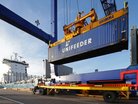How DP World Cuts Scope 3 Emissions with Carbon Credits

DP World is taking another leap forward in sustainable logistics with its innovative Carbon Inset Programme Trial (CIPT).
Designed to address supply chain sustainability and the challenge of Scope 3 emissions, this initiative offers importers a practical way to reduce their carbon footprint while earning carbon credits.
Set to launch at London Gateway and Southampton, the programme builds on the success of DP World’s award-winning Modal Shift Programme and highlights the importance of greener logistics.
Importers participating in the trial earn 50kg of CO₂ equivalent carbon credits for every loaded container moved through DP World’s UK terminals. These credits, independently certified and issued quarterly, will highlight each company’s efforts to reduce indirect emissions generated across their supply chains.
How does the Carbon Inset Programme Trial work?
The CIPT operates by leveraging DP World’s existing Energy Transition Contribution charge, applied to all loaded import containers passing through its ports. This charge effectively funds carbon inset certificates, which help offset emissions created during shipping operations.
The benchmark of 50kg CO₂e per container is carefully calculated. It reflects emissions from docked vessels during container handling, combined with the costs associated with adopting lower-carbon fuels within the network operated by Unifeeder, DP World’s short-sea container shipping arm.
To ensure traceability and transparency, the carbon insets are generated using Unifeeder’s GreenBox platform. The system tracks the use of additional lower-carbon fuels across Unifeeder’s Northern European vessel network and issues tokens for every tonne of carbon saved.
All credits adhere to the Smart Freight Centre methodology and undergo independent certification by Bureau Veritas, a globally recognised inspection and certification body.
John Trenchard, DP World’s Vice President Commercial & Supply Chain for the UK, explains the significance of this initiative: “Insetting carbon emissions is a transparent, direct and pragmatic approach with immediate measurable impact for our customers.”
He continues: “By providing easy access to an independently-certified inset programme, we aim to create better awareness and encourage the adoption of more sustainable practices.
"By participating in the trial, a world first, import cargo owners can actively contribute to global decarbonisation efforts while aligning with their own sustainability goals.”
Tackling emissions in ports and shipping
Ports and shipping play a critical role in global trade but remain major contributors to greenhouse gas (GHG) emissions and air pollution. In 2018 alone, ships visiting EU and EEA ports produced a staggering 140 million tonnes of CO₂ emissions.
The environmental impact extends beyond carbon emissions. Ship engines emit harmful pollutants like sulphur dioxide and nitrogen dioxide, which can significantly affect public health. Communities near ports often face increased risks of respiratory diseases, heart conditions and even cancer due to prolonged exposure to air pollution.
Without urgent action, emissions from global shipping could rise to 17% of total carbon dioxide emissions by 2050, threatening the goals outlined in the Paris Agreement.
DP World’s CIPT directly addresses this challenge. If just 50% of import volumes at its UK ports participate in the trial, it could replace more than 11,000 tonnes of traditional marine fuels with lower-carbon alternatives. The result? A projected reduction of 10,000 tonnes of CO₂ emissions — a meaningful step in greening global supply chains.
For participating customers, the benefits go beyond credits. Companies can use these independently-certified certificates to showcase measurable improvements in the carbon intensity of their marine fuel consumption, adding credibility to their sustainability efforts.
DP World’s sustainability drive
The CIPT aligns seamlessly with DP World’s overarching sustainability strategy, Our World, Our Future. This strategy highlights the company’s commitment to addressing climate change and driving sustainable innovation across its operations.
DP World focuses on key areas, including:
- Climate change: Aiming for net zero GHG emissions by 2050 across its value chain, DP World has already achieved a 4% reduction in energy consumption and a 5% drop in CO₂ emissions since 2019.
- Smart technologies: Using advanced technology to optimise operations and reduce energy and resource use.
- Water conservation: Supporting WaterAid to deliver clean water infrastructure and safeguard ocean health.
- Community impact: Increasing contributions to community projects by 34% in 2022, benefiting over 255,000 women and girls globally.
- Strategic partnerships: Collaborating with organisations like UNICEF and The Earthshot Prize to further sustainable development goals.
By combining bold initiatives like the CIPT with sustainable partnerships and technological innovation, DP World demonstrates its role as a leader in decarbonising global trade.
As ports remain central to supply chains, tackling Scope 3 emissions becomes increasingly vital.
By incentivising importers to take tangible action, DP World is not only helping its customers meet their sustainability goals but also advancing global decarbonisation efforts.
Make sure you check out the latest industry news and insights at Scope 3 Magazine and be part of the conversation at our global conference series, Sustainability LIVE and Procurement & Supply Chain LIVE.
Discover all our upcoming events and secure your tickets today. Subscribe to the Scope 3 Magazine newsletter.
Scope 3 Magazine is a BizClik brand.
- The Evolving Role of Chief Sustainability OfficersScope 1 2 and 3
- Scope 3: Baltic States end Russian Energy DependenceSustainable Procurement
- Nissan Expands Green Steel to cut Scope 3 EmissionsSupply Chain Sustainability
- Evri & Protega Tackle Scope 3 via Sustainable PackagingTransportation & Logistics

